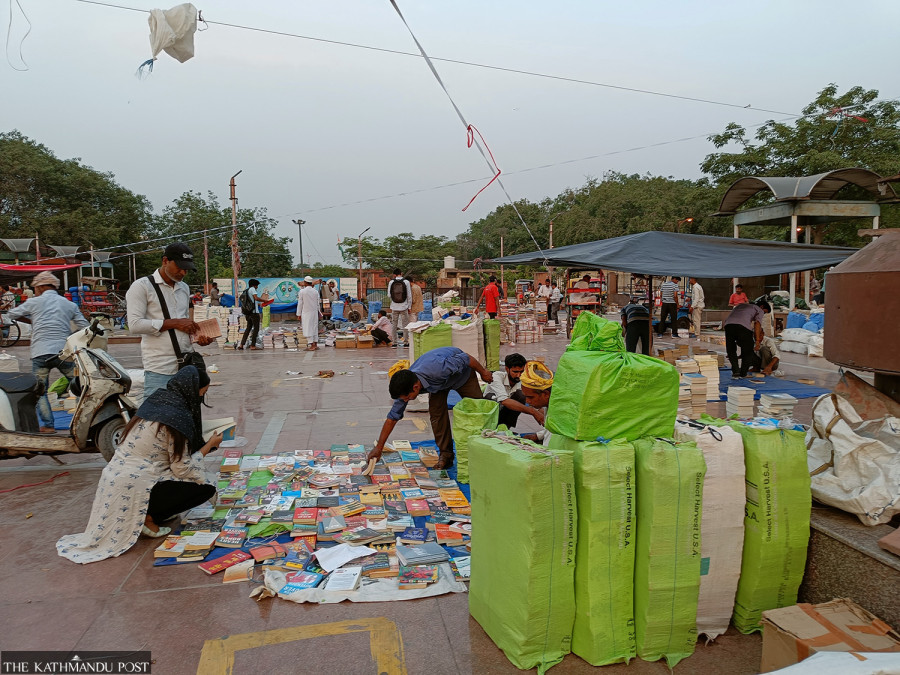Books
Here’s what a ‘haat bazaar’ in Delhi is selling—books
Every Sunday, a local fair in Daryaganj sells a wide range of books at relatively lower prices, making it a haven for students and collectors alike.
Rajesh Mishra
Typically, a ‘haat bazaar’ is a weekly market that has been set up either in the cities or rural areas. In such bazaars, we think of shops that sell green vegetables, food grains, garments, and makeup items. But there is a one-of-a-kind haat bazaar in New Delhi where you will find books instead of these everyday items. Asarfilal Verma, who’s also 60, has spent decades selling books there. “The main goal of this bazaar is to provide books at an affordable price to people,” he says.
This bazaar for books is open every Sunday in New Delhi’s Daryaganj. Once a week, this place becomes a pilgrimage site for book lovers. Spread across the market, either in the shade or on the floor, bookshops spread a large array of books, enticing passersby to sneak a peek. This bazaar is frequented by students from different schools and colleges, book lovers, and youths preparing for government-level examinations. The books that normally cost Rs 500 to Rs 1000 are available at Rs 100 to Rs 200 inside the bazaar. Some books are even sold on the basis of Kilograms.
“We don’t just sell books for students; we also sell books that come in handy to workers of various professions and businesses,” says Verma. “Cookbooks, books on electrical appliances, and carpentry are available here.” Moreover, historical and archaeological books which aren’t found in big bookshops are also available here, which makes it a hub for book lovers.
A student of engineering, Mo Samir, shares that he waits for the Sunday bazaar to buy the books or copies that he needs on a daily basis. “Books by many authors are here, and they are spread on the floor, which makes it easy to pick,” he says while searching for books in the market. “On top of that, books are cheaper here. It’s less than half of the original price.”
A bookseller, Tapan Kumar, highlights the price as an important factor in why the market is such a hit. “Books are available elsewhere too, but not at the price we sell,” he says.
The ‘Sunday book bazaar’ originally began in 1964 AD. In the early days, books were sold on the footpath on a nearby street. Since that created a fuss in traffic management, the administration tried to remove the sellers. The vendors, however, weren’t giving up so soon. They went to court when the footpath market was removed by the police department. In 2007, the court provided a lifeline to the bazaar. A hearing from the court gave the book bazaar a place in the women’s haat bazaar.
One of the reasons why this bazaar is open on Sunday is because Sunday is a public holiday when schools, colleges, and the Darya Ganj market remain closed. This ensures that books become the central focus.
The chief of the bazaar association, Kamar Shaid, says the old scrap market is the primary source for the books. “Near the Jama Mosque, there was an old scrap market. There, one could find various electrical items coming from big houses. The source for old books is also established there,” he says. “Since 1971 AD—since I was 18—I’ve been bringing books from there and selling them here.”
The bazaar faces a few troubles once in a while, he recalls. Over the past 25 years, he has struggled with the police administration and the municipality, he adds.
“The Sunday book bazaar remains an identity of New Delhi,” says an assistant professor at Jindal School of Language and Literature, Kanupriya Dhingra. She did a PhD in the very bazaar because of its peculiar origin story and history. “Getting books cheaply isn’t the only attraction of this bazaar. People come from all over with a strong hope that books that aren’t anywhere else can be found here,” she says.




 13.12°C Kathmandu
13.12°C Kathmandu










